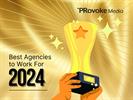Paul Holmes 04 Mar 2003 // 12:00AM GMT
Forget the bingo parties; bring on the rock ‘n’ roll. The Basilica of Saint Mary, one of Minneapolis’ landmark downtown churches, found that combining rock bands and plenty of food and refreshments brought in more than money. It also brought people – to church. Since the first Basilica Block Party seven years ago, the number of households belonging to the Basilica has doubled, from 2,200 to 5,000. And 65 percent of the members today are under age 35, which was a key demographic the Basilica had wanted to attract.
So how did it happen? The Basilica Block Party had grown into one of downtown Minneapolis’ most pre-eminent summertime outdoor events. However, while the event had been increasing in popularity over the past several years, media coverage had been decreasing. In the past, media coverage had been driven by the line-up of bands and performers at the event. While this type of media coverage was important and helped to sell tickets, it did little to position the Basilica as one of the most progressive churches in the Twin Cities.
Enter Karwoski & Courage. In the agency’s first year working with the Basilica Block Party, and on a pro bono basis, local media coverage increased dramatically. In fact, church organizers credited Karwoski & Courage and the extensive event coverage with selling out of tickets for the two-day concert for the first time ever!
Challenge/Opportunity:
During the past several years, the Basilica Block Party had helped break generation barriers and attract younger parishioners. Yet, the church did not accomplish this without attracting controversy as well. Many older parishioners thought it was inappropriate to serve alcohol and play rock ‘n’ roll on the steps of the oldest Basilica in the country.
The media had never paid much attention to the Basilica Block Party – it was simply another summer event in downtown Minneapolis. Performers booked at the event were thought of as fairly mainstream, so didn’t attract the attention of music writers. In the past, TV reporters had covered other summer festivals, and print usually relegated the event to the calendar section.
Karwoski & Courage believed it was important to concentrate on positioning the event as a great place for Christian singles to meet other Christian singles, and focused on trends such as the apparent resurgence in the popularity of religion for young people.
Research:
Research was conducted to identify trends among young people and their attitudes toward religion, as well as to isolate demographics of the intended audience.
Strategic Approach and Campaign Execution:
Recognizing that attendees came primarily from the Twin Cities metro area, Karwoski & Courage focused on maximizing local media coverage. The objectives were to:
· Drive early ticket sales of the event, and attempt to sell all tickets for the first time in the event’s history.
· Increase attendance at the Block Party, particularly among its key constituencies.
· Increase awareness of the Basilica as a young and progressive parish.
To do that, the agency created a number of unique pitch ideas, including:
· This is not your father’s Catholic church – Pitched trend piece about the resurgence in the popularity of religion among young people. The Basilica is reinvigorating church-going for people under 35, with a more relaxed priest to whom young people can relate and a redefined approach to organized religion for young people.
· Basilica Block Party bambinos – Pitched feature about the couples that met at the Block Party during its seven-year history that have since married and had kids.
· “I’m never going to a singles bar again” – Pitched feature story about why church and the Basilica’s social events are a better place to meet other Christian singles.
· A bunch of bands and a Basilica – Developed publicity materials about the bands performing at the event.
· Support your church with rock ‘n’ roll – Used existing relationships with other Catholic parishes to promote the Basilica Block Party internally.
· “God, we pray there won’t be a tornado” – Developed crisis communications plan in case of an “Act of God,” no pun intended.
· Undercroft update – Pitched community relations/business story about the work being done on the undercroft as well as other Basilica outreach efforts.
In addition, posters, fliers and newspaper ads were created, plus a direct mail piece promoting advance ticket sales that was sent to past ticket purchasers, Basilica members and alumni of local Catholic high schools and universities.
Summary of Results:
· Karwoski & Courage achieved unprecedented media coverage for the Basilica Block Party.
· More than 75 reporters, producers and photographers were in attendance to cover the event.
· Garnered a whopping 67 television clips during the span of one week, and 59 print clips, most of which carried photos.
· The Minneapolis Star Tribune, the region’s largest daily, printed an above-the-fold photo and article of the Basilica Block Party on the front page of its July 8 edition.
· Coverage was entirely positive, and included every key message point.
· For the first time in the event’s history, tickets for both days sold out. As one reporter commented, “you know it’s a good event when the ticket scalpers are lining out in front!”
McDonald’s Asian Pacific American Community Service Awards
McDonald’s
Golin/Harris International, Washington, D.C.-
Food service (may be under Restaurants)
Multicultural
In 1999, The McDonald’s Family Restaurants of Greater Washington, D.C. and Golin/Harris International created the “McDonald’s Asian Pacific American Community Service Awards” program to honor local high school seniors who have committed outstanding community service on behalf of the Asian Pacific Islander community and had exhibited superior qualities in scholarship, leadership and character. This is the McDonald’s Corporation’s first and only Asian Pacific Islander scholarship on the East Coast.
Opportunity
2000/2001 marked the second year of “McDonald’s Asian Pacific American Community Service Awards” - making this program the McDonald’s Corporation’s first college scholarship program on the East Coast that honors Asian Pacific Islanders. The McDonald’s Family Restaurants of Greater Washington, D.C. along with Golin/Harris International had the opportunity to capitalize on this new outreach initiative to the Asian Pacific Islander community and market McDonald’s to a new population segment in order to increase food sales.
In the second year of the scholarship program, fourteen high school seniors from the Greater Washington, D.C. area (West Virginia, Virginia, Maryland, and Washington, D.C.) area were chosen to receive a $1,000 scholarship to the college or university of the student’s choice and a $200 donation to their community service organization.
The McDonald’s Asian Pacific Islander honorees were chosen based on an application, a letter of recommendation from one community service organization, five short answer questions, and a 250-word essay on discussing how the student’s volunteer work lends itself to the betterment of the Asian Pacific Islander community. The honorees were chosen by a selection committee consisting of McDonald’s representatives. Due to free public service announcements and free “Call-to-Enter” advertisements in the local API media, we received approximately 150 applications in its second year.
In addition, the fourteen honorees were also honored in an advertising and public relations campaign developed to promote our young Asian Pacific American leaders to the entire community. McDonald’s local advertising agency, Arnold Communications, partnered with Asian Fortune to publish a free advertisement congratulating our “McDonald’s Asian Pacific American Community Service Awards” recipients in their May issue. Also, the McDonald’s Restaurants of Greater Washington, D.C. displayed a 11x17 inch poster of the Asian Fortune advertisement in their stores during May – Asian Heritage Month.
Golin/Harris International used media publicity and in-store advertising to market this scholarship and our new outreach initiatives to increase the food sales at our local McDonald’s restaurants. We hoped that as more Asian Pacific Islanders heard about McDonald’s efforts in the Asian communities, more Asian Americans would take the opportunity to frequent McDonald’s for their food purchases.
Research
McDonald’s is well-known throughout the Greater Washington, D.C. community for their diversity initiatives and educational scholarships that reach numerous ethnic groups.
The McDonald’s Family Restaurants of Greater Washington, D.C.’s goal was to continue their local outreach efforts and allow for additional local opportunities in the Asian Pacific Islander community. Additionally, we receive local feedback from an annual survey conducted by McDonald’s research partner, Moore and Associates, that surveys our customers’ attitudes about McDonald’s in the area of community outreach.
According to 2000 research specifically designed for the Greater Washington, D.C. area, we asked our customers, “What company provides the most community service?” McDonald’s ranked number one as the most community-minded company. When customers were asked “What makes effective community outreach?” The number one answer was “Helping children/helping youth.”
And finally, customers were asked if McDonald’s community involvement would make them more likely to eat at McDonald’s. Over fifty percent of McDonald’s Asian Pacific American consumers responded “yes” – one of the highest scores of any consumer group.
Additionally, members of Golin/Harris International met with numerous leaders in the Chinese, Korean, and Vietnamese communities in order to design the five short-answer questions and the essay question that are featured on the scholarship application. Due to the fact that this is McDonald’s first Asian Pacific Islander scholarship on the East Coast, the application was approved by the legal department of the McDonald’s Corporation.
The findings of this research combined with the support of the local Asian Pacific Islander community defined our objectives. Our objective of this diversity scholarship program was to show that this idea would provide a local community diversity initiative addressing the education of our youth and promoting community service. Our plan was to embrace the comments of our customers and design a program that addressed each public concern while showcasing our new scholarship program’s support within the Greater Washington, D.C. Asian Pacific Islander community.
Strategic Approach
Planning for the 2001 “McDonald’s Asian Pacific American Community Service Awards” began in the fall of 2000. Important first steps included: sending local media and API media press releases to publish/create free PSA’s as a “Call-to-Enter”; inviting prominent Asian Americans to participate in the scholarship ceremony; securing an unique location for the awards reception that gives a perspective on Washington, D.C.; distributing student applications to every high school and Asian community group within the Greater Washington, D.C. area; and gain McDonald’s approvals to create and display congratulatory posters in each of the local McDonald’s restaurants in honor of Asian Heritage Month in May 2001.
In order to promote this scholarship opportunity and secure applicants, an Asian McDonald’s Owner/Operator spoke for thirty minutes on WHC-RADIO, a local Korean Radio station, regarding our scholarship program and how we are proud to serve our local Asian communities with a new educational opportunity. McDonald’s was not charged for the airtime. In addition, the enclosed scholarship “crew-stuffer” was attached to the paycheck of every McDonald’s store employee in January 2001 in order to ensure that knowledge of the scholarship opportunity was known to each McDonald’s employee. Out of fourteen scholarship recipients for 2001, two honorees were McDonald’s crewmembers.
The planning process continued with members of the McDonald’s family choosing fourteen honorees (three scholarships were funded by local McDonald’s Owner/Operators).
Campaign Execution
Completing the tasks outlined in the Planning section is efficiently done with financial assistance from McDonald’s partner, The Coca-Cola Company, as well as the support of the local McDonald’s Owner/Operators. Three local McDonald’s Owner/Operators supplied personal funding for three of the scholarships.
Final arrangements included: securing former National President of the Organization of Chinese Americans Ginny Gong as our Mistress of Ceremonies; securing Newsweek Magazine’s honoree for “Women of the 21st Century” Christine Chen and President of the Korean American Alliance Julie Ju-Kyung Park as Keynote Speakers; mailing invitations to over 300 local Asian Pacific Islanders leaders and McDonald’s representatives; writing a script; creating a program booklet; scheduling children’s dance groups from the Vietnamese and Chinese community to perform during the scholarship ceremony. In March 2001, Hotel Washington, one of Washington, D.C.’s oldest monuments, served as our program’s host.
In addition, the Greater Washington, D.C. community welcomes this diversity initiative as a celebration of Asian Pacific American heritage that only a company as community-minded as McDonald’s can create and implement in a first-class manner. For example, we received a Mayoral Proclamation stating that Thursday, March 29, 2001, was “McDonald’s Asian Pacific American Community Service Awards” Day in Washington, D.C. This honor was presented by the Assistant Director of Asian Pacific Islander Affairs in Washington, D.C. Linda Tse.
Results
The 2001 “McDonald’s Asian Pacific American Community Service Awards” was measured on several criteria. Client feedback, honoree feedback, and coverage from the local media and the local Asian Pacific Islander media all contributed to our overall evaluation of the program. In our second year, we had honorees of Chinese, Korean, Vietnamese, Japanese, Indian, and Filipino heritages. The McDonald’s Owner/Operators as well as the McDonald’s Corporation have championed this program and expect the scholarship to reach new levels of creativity and success in the future.
As you will see in the supplemental materials, several newspaper clippings praise McDonald’s as a corporation that sets the standard in recognizing the youth leaders of tomorrow.
As we prepare for the 2002 “McDonald’s Asian Pacific American Community Service Awards”, we look at our past success with this diversity initiative and challenge ourselves to make this program even better as we continue to honor and recognize the Asian Pacific Islander leaders of tomorrow.


































.jpg)

















